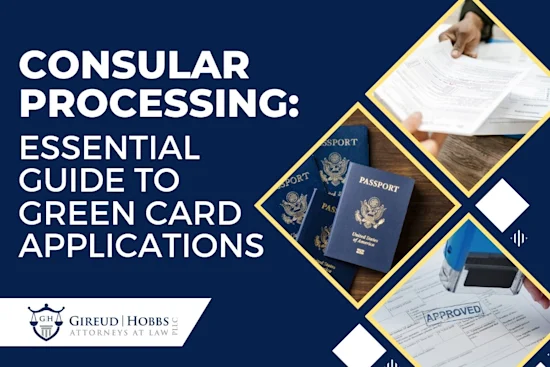Immigrants in the United States apply for a green card using either Adjustment of Status or Consular Processing. This guide explains the information about consular processing that you may want to know before speaking with a consular processing lawyer.
In this guide we provide important information about consular processing and will answer questions such as:
- “What is consular processing?”
- “Who should apply for a green card using consular processing?”
- “Where can I get more information about consular processing?”
Table of Contents
Request A Free Consultation Today!
Request A Free Consultation Today!
What is Consular Processing?
Consular processing is the way an immigrant can apply for a green card from outside the United States. If you are not living in the U.S., your application for a green card will use the consular processing procedure. Your case will be handled by a U.S. consulate or embassy in your home country.
What is Consular Processing vs Adjustment of Status?
The deciding factor between whether to use consular processing or adjustment of status is where you are when you are applying for your green card:

- Adjustment of status is used if you are inside the United States when you apply for a green card.
- If you are living outside the United States when you apply for your green card, you will use consular processing.
The overall eligibility requirements for consular processing and adjustment of status are identical, but their timelines and procedures are different.
Who Should Apply for a Green Card Using Consular Processing?
Green card applicants living outside the United States when applying will use the consular processing procedure. You cannot apply for a green card using consular processing unless you are eligible for an immigrant visa and the visa petition has been filed.
Visa petitions that qualify a foreign national for consular processing of a green card application include:
- Submitted Form I-130 petitions for family-based immigrant visas
- Submitted Form I-140 petitions for employment-based immigrant visas
Note: If you’ve been selected for the Diversity Visa lottery and live outside the United States, you will also use the consular processing procedure. If you need information about consular processing as a Diversity Visa lottery winner, please contact a skilled immigration attorney before beginning the process of this once in a lifetime opportunity.
Consular Processing for Marriage-Based Visas
If your immigrant visa petition is based on marriage, you’ll either get a CR-1, IR-1 or F2 visa depending on how much time has passed since your wedding and if your spouse is a U.S. citizen or lawful permanent resident. The consular processing procedure is similar regardless of which immigrant visa for which you qualify. In most scenarios, you cannot self-petition for an immigrant visa.
Because visas based on marriage are so common, let’s look at the important information about consular processing for marriage-based green cards as an example using this step-by-step instructional guide:
- Your spouse in the United States meets with a consular processing lawyer.
- With the consular processing lawyer’s help, your spouse files a Form I-130, Petition for Alien Relative with U.S. Citizenship and Immigration Services (USCIS).
- USCIS processes your spouse’s petition. This may take several months to several years depending on your case and the current USCIS backlog.
- USCIS approved the petition.
- Your consular processing lawyer will check the visa bulletin to determine if a green card is immediately available to you. It will be if your spouse is a U.S. citizen, but the wait will be longer if your spouse is a green card holder.
- When a visa becomes available, USCIS will send your spouse’s petition to the National Visa Center (NVC) for processing.
- The NVC will inform you when to pay fees and provide you with documentation you will need to apply for your green card.
- You’ll need to fill out and submit Form DS-260. Your consular processing lawyer will explain exactly how to fill this form out.
- The NVC will send your case to the U.S. consulate or U.S. embassy near you.
- The consulate or embassy will contact you to arrange an in-person interview.
- Your consular processing lawyer will prepare you for your interview.
- Your consular processing lawyer will help you arrange for a medical exam by an approved physician.
- You will go to your interview, be placed under oath, and asked questions at your interview. You will also bring your original documents (and translated documents if the originals are in a language other than English). They may take your passport, but it will be returned to you.
- The interviewing officer will decide on your application.
- If approved, you will be sent a sealed visa packet that must remain sealed until its opened at the port of entry by a U.S. border official.
- You arrive at the port of entry and a U.S. border patrol official will inspect you and open your visa packet.
- You will be admitted into the United States with an immigrant visa.
- USCIS will mail you your actual green card.
After completing these steps, you will be a green card holder.
Note: When a green card is marriage-based, it may come with conditions depending on how long you’ve been married by the time the process is over. If your green card is conditional, your immigration attorney can help you request the removal of the conditions when you are eligible.
With your new green card, you are free to live and work anywhere in the country.
Where Can I Get More Information About Consular Processing?
If you’d like more information about consular processing, discuss it with your attorney. If you’d like to schedule a free consultation with a consular processing attorney at Gireud | Hobbs, PLLC, contact us today.

